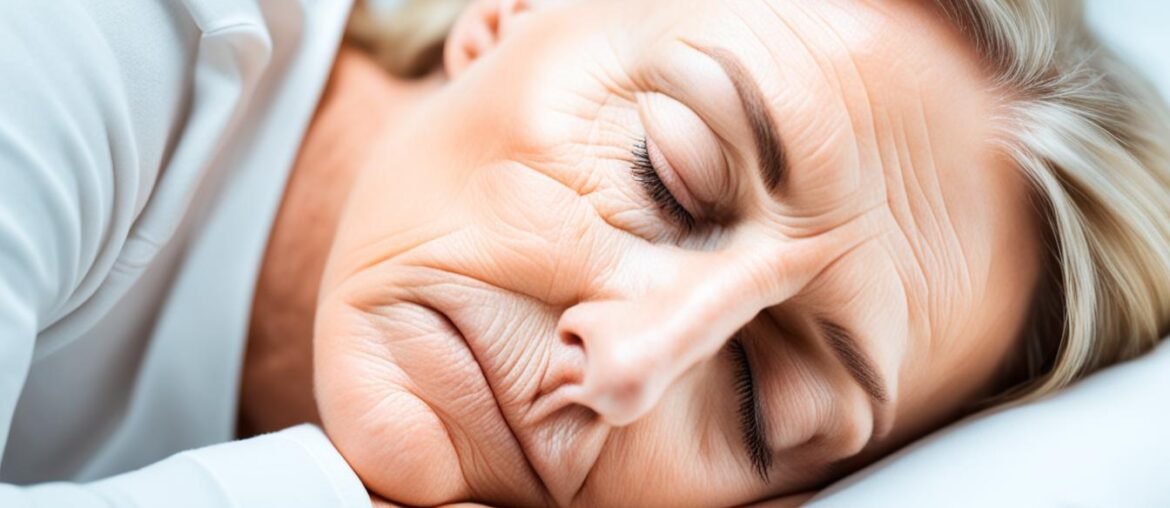Did you know that sleep quality can significantly affect the aging process of your skin? It’s true! Various studies have shown that chronic poor sleep quality is associated with increased signs of intrinsic aging, diminished skin barrier function, and lower satisfaction with appearance.
When we think about maintaining youthful skin, factors like skincare products and lifestyle choices often come to mind. However, the importance of sleep is often overlooked. The quality of your sleep can have a profound impact on the health and appearance of your skin.
Key Takeaways:
- Poor sleep quality is associated with increased signs of aging and diminished skin barrier function.
- Good sleepers have been found to have lower intrinsic skin aging scores and better recovery from skin barrier damage.
- Inadequate sleep can lead to premature aging, decreased skin’s ability to recover after sun exposure, and a decrease in overall skin health.
- Practicing good sleep hygiene is essential for enhancing skin health and preventing premature skin aging.
- By prioritizing good sleep habits, individuals can achieve a more youthful complexion and improve their overall well-being.
The Effects of Sleep on Skin Health and Aging
Quality sleep plays a crucial role in maintaining healthy skin and preventing premature aging. A study conducted on healthy Caucasian women highlights the impact of sleep on skin health and aging. The findings revealed significant differences between good sleepers and poor sleepers in terms of their skin aging scores and recovery from skin barrier damage.
In the study, good sleepers exhibited lower intrinsic skin aging scores, indicating fewer visible signs of aging such as wrinkles, fine lines, and sagging skin. On the other hand, poor sleepers displayed higher levels of transepidermal water loss, leading to dry and dehydrated skin.
Furthermore, the study examined the recovery of the skin barrier after exposure to ultraviolet (UV) light. Good sleepers demonstrated better recovery from erythema, a skin condition characterized by redness and inflammation. In contrast, poor sleepers experienced slower skin barrier recovery, making them more susceptible to UV damage.
These findings highlight the profound impact of sleep on skin health. Quality sleep allows the skin to replenish and repair itself, optimizing its natural functions and defenses against external stressors. Conversely, sleep deprivation disrupts the skin’s rejuvenation process, leading to compromised skin barrier function and accelerated skin aging.
Good sleep is not only essential for overall well-being but also for maintaining youthful and healthy skin. Chronic sleep deprivation can have detrimental effects, causing increased signs of aging and diminished skin health. Prioritizing quality sleep should be an integral part of any skincare routine.
The Link Between Sleep Deprivation and Skin Aging
Sleep deprivation, characterized by consistently inadequate or poor-quality sleep, has been linked to accelerated skin aging. When deprived of sufficient rest, the body experiences increased production of the stress hormone cortisol, which can break down collagen, a crucial protein that maintains skin elasticity and firmness.
Moreover, sleep deprivation impairs the skin’s ability to repair and recover, leading to a weakened skin barrier and increased sensitivity to environmental irritants. This can result in skin conditions such as acne, eczema, and dermatitis.
Additionally, sleep deprivation can disrupt the balance of other hormones, including growth hormone and melatonin, both of which are vital for healthy skin. Disruptions in hormone levels can inhibit the production of new skin cells, impair skin regeneration, and diminish the skin’s natural ability to heal and regenerate.
The image above visually represents the interconnected relationship between sleep and skin health, emphasizing the importance of quality sleep in achieving vibrant and youthful skin.
The Role of Sleep in Skin Rejuvenation
During sleep, the body undergoes essential processes that contribute to skin rejuvenation. Adequate sleep promotes optimal blood circulation, allowing nutrient-rich blood to reach the skin’s surface and nourish it. This increased blood flow also helps in eliminating toxins and waste products, resulting in a clearer complexion.
Furthermore, sleep is the time when the body repairs and regenerates skin cells. It increases the production of collagen and elastin, the proteins responsible for maintaining skin elasticity, firmness, and a youthful appearance.
| Sleep | Benefits for Skin |
|---|---|
| Good quality sleep |
|
| Sleep deprivation |
|
The table above summarizes the impact of sleep quality on skin rejuvenation, emphasizing the transformative benefits of good sleep on maintaining youthful and radiant skin.
The Link Between Sleep Quality and Skin Aging
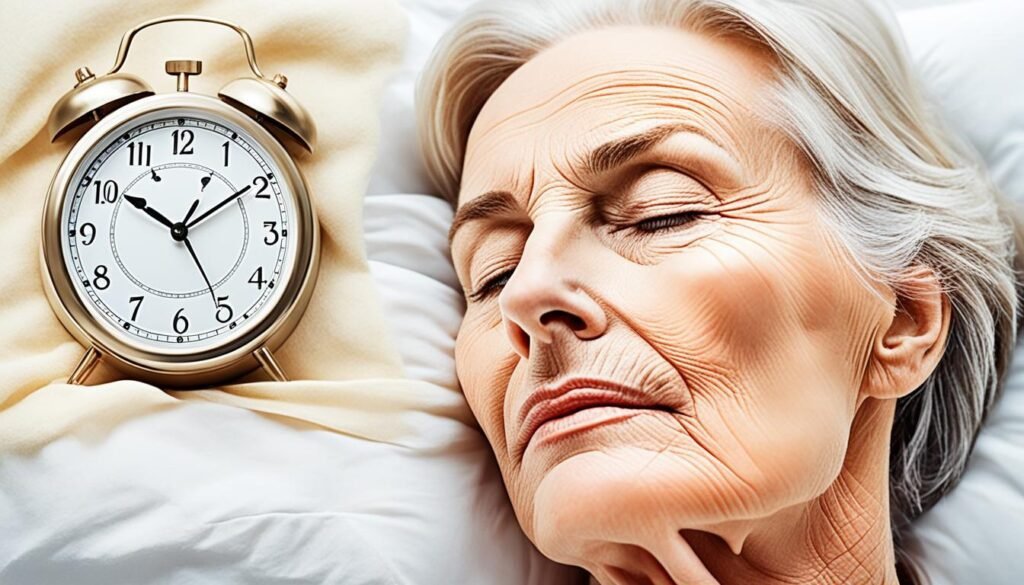
Inadequate sleep has a profound impact on skin health and can accelerate the aging process. Sleep deprivation not only affects our overall well-being but also manifests visible signs of premature aging on the skin. The effects of inadequate sleep on skin health are multi-faceted, encompassing various aspects of skin function and appearance.
The Effects of Sleep Deprivation
Sleep deprivation can diminish the skin’s barrier function, which acts as a protective shield against environmental toxins and irritants. When our skin barrier is compromised, it becomes more susceptible to damage and moisture loss, leading to dryness, sensitivity, and the formation of wrinkles and fine lines.
“Sleep deprivation can weaken the skin’s natural defense mechanisms, leaving it more vulnerable to external stressors.”
Sleep also plays a vital role in the skin’s ability to recover after exposure to harmful UV radiation. Research has shown that inadequate sleep reduces the skin’s ability to repair and regenerate, prolonging the recovery process and increasing the risk of sun damage.
Effects of Poor Sleep Quality on Aging
A study conducted on a group of participants found that those with poor sleep quality exhibited decreased skin elasticity and increased pigmentary changes compared to those who reported better sleep quality.
| Effects of Poor Sleep Quality on Aging | Benefits of Quality Sleep for Skin Aging |
|---|---|
| Increased signs of premature aging | Reduction in wrinkles and fine lines |
| Decreased skin barrier function | Improved skin elasticity |
| Impaired skin recovery after sun exposure | Maintenance of a clear complexion |
| Reduced dark circles under the eyes |
Adequate sleep is essential for maintaining healthy skin and delaying the onset of skin aging. By prioritizing good sleep habits and ensuring an optimal sleep environment, we can improve our skin health and promote a more youthful complexion.
The Impact of Sleep on Skin Function
Sleep plays a vital role in maintaining and repairing the body’s physiological systems, including the skin. Adequate sleep quality has a profound effect on the health and function of our skin, influencing various biological processes that contribute to its overall well-being.
One of the key ways sleep affects our skin is through the regulation of growth hormone production. During deep sleep, our bodies release growth hormone, which plays a crucial role in tissue repair and regeneration. This hormone helps promote the growth of new skin cells, aiding in the healing of wounds, scars, and overall skin restoration.
Sleep also plays a significant role in the creation of hormones that fight infection and inflammation in the body. When we sleep, our immune system goes into overdrive, producing cytokines and other protective substances. These substances help combat inflammation, contribute to wound healing, and maintain the skin’s natural defense mechanisms. Chronic sleep deprivation disrupts this delicate immune balance, potentially leading to impaired skin barrier function and increased vulnerability to infections.
Furthermore, sleep is essential for the formation and maintenance of pathways in the brain related to learning and memory. Quality sleep allows our minds to process and consolidate experiences, including the information we acquire about our skincare routine and specific skincare products. This cognitive process helps us make informed decisions and adapt our routines to achieve optimal skin health.
Overall, prioritizing sleep quality is crucial for maintaining the functional integrity of our skin. It influences the production of growth hormone, the creation of hormones that fight infection and inflammation, and the formation of brain pathways related to learning and memory. By consistently getting enough restful sleep, we can support our skin’s natural healing processes and enhance its overall function and appearance.
Image: Illustration depicting the connection between sleep quality and its effect on skin function
The Relationship Between Sleep and Skin Appearance
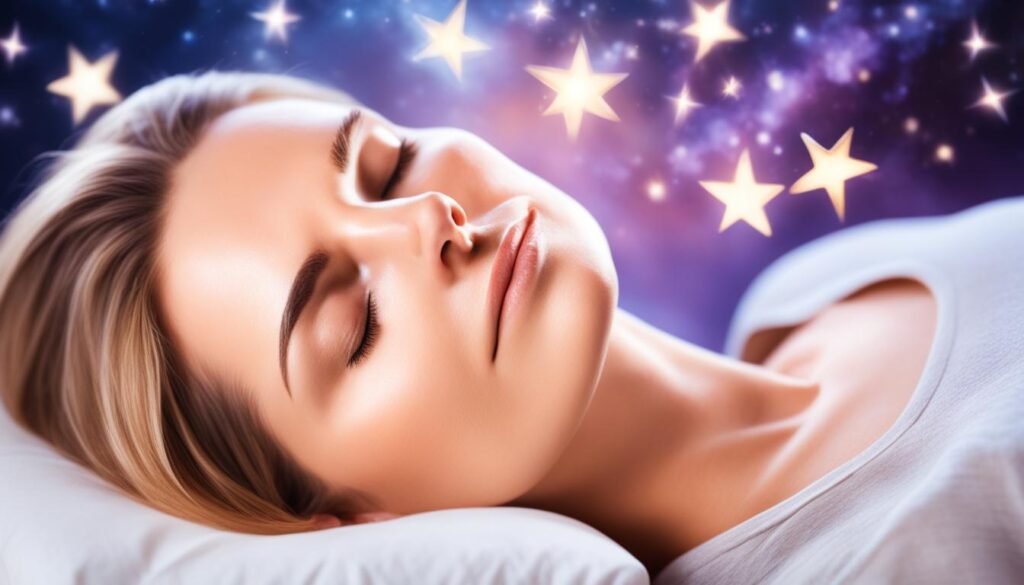
When it comes to achieving healthy and youthful-looking skin, a good night’s sleep plays a crucial role. Quality sleep has numerous benefits for skin rejuvenation and overall skin appearance.
“Getting enough quality sleep is like giving your skin a refreshing spa treatment every night.”
Reduction in Wrinkles and Improved Skin Elasticity
One of the significant benefits of quality sleep on skin rejuvenation is a reduction in the appearance of wrinkles. During deep sleep, the body produces collagen, a protein that helps maintain skin strength and elasticity. This collagen production helps reduce fine lines and wrinkles, giving your skin a smoother and more youthful appearance.
Maintaining a Clear Complexion and Reducing Dark Circles
Quality sleep also contributes to maintaining a clear and glowing complexion. During sleep, the body’s blood flow to the skin increases, allowing important nutrients and oxygen to reach the cells, promoting skin repair and rejuvenation. This enhanced circulation can help reduce skin redness, acne, and other skin conditions, giving you a fresher-looking complexion.
Furthermore, quality sleep can greatly reduce the appearance of dark circles under the eyes. Lack of sleep can cause blood vessels under the thin skin of the eye area to dilate, resulting in dark, puffy circles. By prioritizing good sleep habits, you can minimize these unwanted dark circles and achieve a more well-rested appearance.
Prevention of Hair Loss and Healthy-Looking Hair
Did you know that sleep quality also affects the health of your hair? Regular quality sleep plays a role in preventing hair loss and maintaining healthy-looking locks. During sleep, the body repairs and regenerates its cells, including those responsible for hair growth. Adequate sleep ensures that your hair follicles receive the nourishment and rest they need, resulting in stronger, shinier, and more voluminous hair.
By prioritizing good sleep hygiene and creating a sleep routine that promotes quality rest, you can enjoy the remarkable benefits of sleep on skin rejuvenation. From reducing wrinkles and improving skin elasticity to maintaining a clear complexion and preventing hair loss, quality sleep is an essential ingredient for achieving and maintaining vibrant and youthful-looking skin.
The Role of Sleep Hygiene in Enhancing Skin Health
Practicing good sleep hygiene is essential for improving sleep quality and enhancing skin health. By implementing a skincare routine for better sleep and adopting healthy sleep habits, individuals can optimize their beauty rest and promote overall skin well-being.
A key aspect of sleep hygiene is maintaining a regular sleep schedule. Going to bed and waking up at consistent times helps regulate the body’s internal clock, promoting better-quality sleep. This consistency also benefits the skin by allowing it to follow a natural circadian rhythm, which influences various skin functions, including the production of collagen and the repair of damaged cells.
Creating a comfortable sleep environment is another crucial element of good sleep hygiene. Consider factors such as temperature, lighting, noise level, and mattress quality to ensure optimal comfort. Invest in high-quality bedding and pillows that support proper alignment and pressure relief for the skin.
Regular exercise can also improve sleep quality and skin health. Engaging in physical activity during the day helps reduce stress and tension, making it easier to fall asleep and stay asleep at night. Additionally, exercise promotes blood circulation, which delivers oxygen and nutrients to the skin, contributing to a healthy complexion.
Winding down before bed is essential to prepare the body for sleep. Establishing a soothing bedtime routine can help signal to the body that it’s time to relax and prepare for rest. Incorporate calming activities such as reading, taking a warm bath, or practicing relaxation techniques like meditation or deep breathing exercises.
Avoiding electronic devices before sleep is crucial as the blue light emitted by screens can disrupt the body’s production of melatonin, a hormone that regulates sleep. Instead of scrolling through your phone or watching TV, try engaging in relaxing activities or reading a book to promote better sleep quality.
Moreover, lying awake in bed at night can contribute to anxiety and insomnia. If you find yourself unable to fall asleep after 20 minutes, it’s recommended to get out of bed and engage in a calming activity until you feel drowsy. This helps prevent the mind from associating the bed with wakefulness, making it easier to fall asleep when you return.
By practicing good sleep hygiene and incorporating these healthy sleep habits into your routine, you can not only improve sleep quality and overall well-being but also enhance your skin health. Remember, restful nights lead to radiant days!
Tips for Enhancing Sleep for Radiant Skin
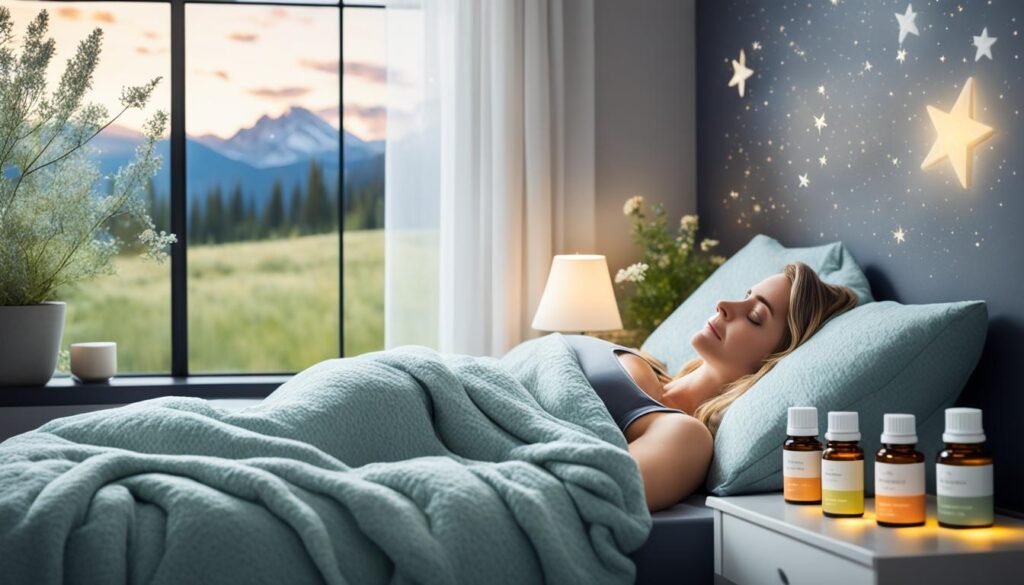
When it comes to maintaining youthful and glowing skin, quality sleep plays a crucial role. Incorporating some simple tips into your bedtime routine can help optimize your sleep and promote a more radiant complexion. Here are some beauty sleep tips to ensure you wake up with revitalized and youthful skin:
- Stick to a sleep schedule: Establish a consistent sleep routine by going to bed and waking up at the same time every day. This helps regulate your body’s internal clock and ensures a more restful sleep.
- Create a relaxing bedtime routine: Engage in calming activities before bed, such as reading a book, taking a warm bath, or practicing relaxation techniques like deep breathing or meditation. These rituals can help signal to your body that it’s time to unwind and prepare for sleep.
- Optimize the sleep environment: Create a sleep-friendly atmosphere in your bedroom. Keep the room cool, dark, and quiet. Invest in a comfortable mattress, supportive pillows, and breathable bedding to enhance your sleep quality.
- Avoid stimulating activities before bed: Minimize exposure to bright screens, such as phones, tablets, and laptops, in the hours leading up to bedtime. The blue light emitted by these devices can interfere with your body’s natural sleep-wake cycle.
- Manage stress levels: Incorporate relaxation techniques into your daily routine, such as yoga or mindfulness exercises, to help reduce stress. High stress levels can disrupt sleep and contribute to skin problems like acne and inflammation.
By implementing these tips, you can establish healthy sleep habits that promote not only better sleep but also youthful and glowing skin. Take the time to prioritize your sleep, and your skin will thank you.
The Connection Between Sleep and Overall Well-being
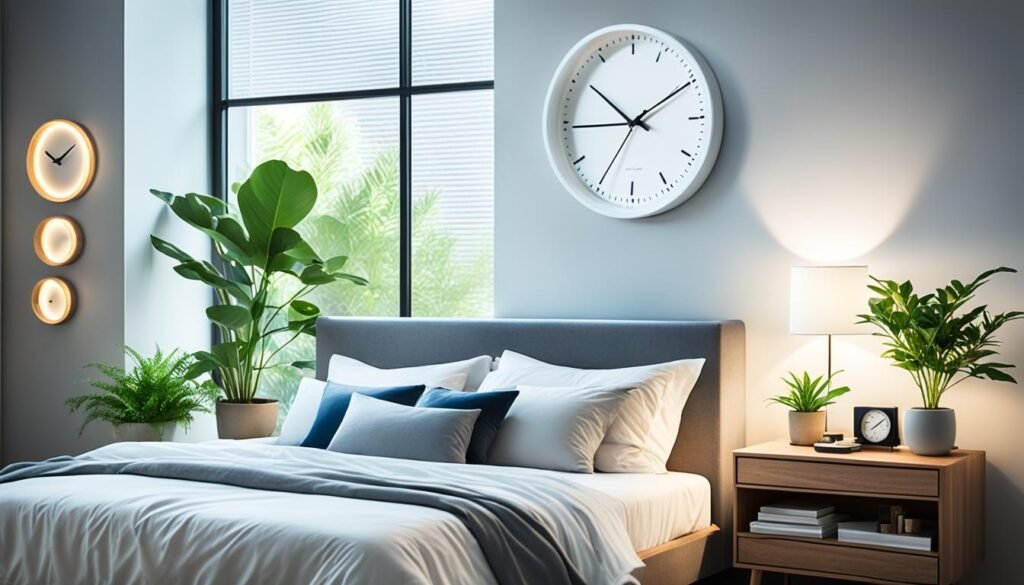
Getting enough quality sleep not only impacts skin health but also has a significant impact on overall well-being. Adequate sleep is essential for the proper functioning of the body and mind, and chronic sleep deprivation can have severe consequences.
Sleep plays a crucial role in maintaining a healthy immune system. Lack of sleep can weaken the immune system, making individuals more susceptible to infections and diseases. Studies have shown a link between chronic sleep deprivation and increased risk of obesity, diabetes, cardiovascular diseases, and certain types of cancer.
Furthermore, sleep is vital for cognitive functions such as memory consolidation, learning, attention, and problem-solving. It allows the brain to rest and rejuvenate, improving overall mental clarity and performance. Conversely, sleep deprivation can lead to difficulties in concentration, impaired decision-making, and decreased productivity.
It’s important to note that sleep quality is just as important as sleep quantity. Poor sleep can affect mood and emotional well-being, leading to increased irritability, mood swings, and mental health issues such as depression and anxiety.
Creating healthy sleep habits and maintaining a consistent sleep routine can greatly improve overall well-being. Here are some tips to enhance sleep quality:
- Stick to a regular sleep schedule, going to bed and waking up at the same time every day.
- Create a relaxing bedtime routine to signal to your body that it’s time to wind down and prepare for sleep.
- Ensure your sleep environment is comfortable, quiet, dark, and at a cool temperature.
- Avoid electronic devices, caffeine, and stimulating activities before bed, as they can interfere with your sleep.
- Manage stress levels through relaxation techniques, such as meditation or deep breathing exercises.
By prioritizing sleep and taking steps to improve sleep quality, individuals can experience not only the benefits of better skin health but also overall improved well-being.
| Health Benefits of Quality Sleep | Consequences of Sleep Deprivation |
|---|---|
| Improved immune function | Increased risk of obesity |
| Enhanced cognitive functions | Higher chances of developing diabetes |
| Reduced stress levels | Greater susceptibility to cardiovascular diseases |
| Lower risk of mental health disorders | Elevated likelihood of certain types of cancer |
Conclusion
Adequate sleep is crucial for maintaining skin health and preventing premature skin aging. Research has consistently shown that poor sleep quality can have detrimental effects on the skin, leading to increased signs of aging, compromised skin barrier function, and lower satisfaction with appearance.
By prioritizing good sleep habits and practicing proper sleep hygiene, individuals can proactively enhance their skin health and achieve a more youthful complexion. This includes establishing a regular sleep schedule, creating a comfortable sleep environment, and adopting relaxation techniques before bed.
Additionally, taking care of one’s overall well-being through sufficient sleep can have a significant impact on skin health. Chronic sleep deprivation has been associated with various medical conditions, including obesity, diabetes, cancer, and compromised immune function. Prioritizing quality sleep is not only beneficial for skin aging but also for overall health and vitality.
Investing in a good night’s sleep can provide numerous benefits beyond skin health, such as improved cognitive function, emotional well-being, and physical performance. By recognizing the importance of sleep and making it a priority, individuals can unlock the transformative power of restful, rejuvenating sleep for optimal skin health and overall well-being.
FAQ
How does sleep quality impact skin aging?
Poor sleep quality has been linked to increased signs of intrinsic aging, diminished skin barrier function, and lower satisfaction with appearance. Good sleep quality, on the other hand, can lead to a reduction in wrinkles, improvements in skin elasticity, and a clear complexion.
What are the effects of sleep on skin health and aging?
Sleep deprivation has been conclusively linked to reduced skin health and accelerated skin aging. Inadequate sleep can lead to signs of premature aging, decreased skin barrier function, and a decrease in the skin’s ability to recover after sun exposure. Good sleep quality, on the other hand, can contribute to maintaining healthy-looking skin.
How does sleep quality affect skin aging?
Sleep quality plays a vital role in maintaining and repairing the body’s physiological systems, including the skin. Chronic poor sleep quality has been associated with higher levels of transepidermal water loss, slower recovery from skin barriers, and slower healing of skin damage caused by sun exposure.
What is the relationship between sleep and skin appearance?
Getting enough quality sleep can lead to a reduction in wrinkles and improvements in skin elasticity. It can also contribute to maintaining a clear skin complexion and reducing dark circles under the eyes. Additionally, regular quality sleep may help prevent hair loss and maintain healthy-looking hair.
How does sleep hygiene enhance skin health?
Practicing good sleep hygiene, such as sticking to a regular sleep schedule, creating a relaxing bedtime routine, optimizing the sleep environment, avoiding stimulating activities before bed, and managing stress levels, is essential for improving sleep quality and enhancing skin health.
What are some tips for enhancing sleep for radiant skin?
Some tips for enhancing sleep for radiant, youthful skin include sticking to a sleep schedule, creating a relaxing bedtime routine, optimizing the sleep environment, avoiding stimulating activities before bed, and managing stress levels.
How does sleep impact overall well-being?
Getting enough quality sleep not only impacts skin health but also has a significant impact on overall well-being. Chronic sleep deprivation has been linked to various medical problems, such as obesity, diabetes, cancer, and immune deficiency.
How can sleep improve skin health and prevent premature aging?
Adequate sleep is crucial for maintaining skin health and preventing premature skin aging. By prioritizing good sleep habits and practicing proper sleep hygiene, individuals can enhance their skin health and achieve a more youthful complexion.

